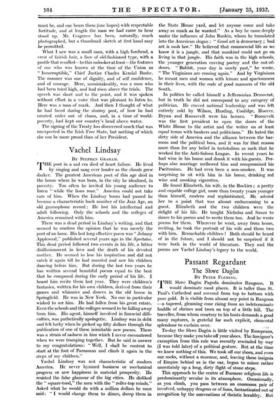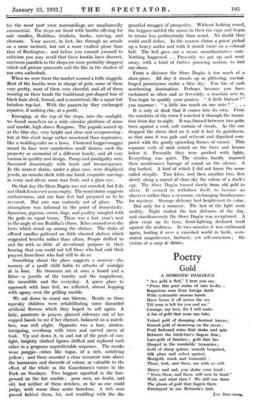By PETER FLEMING.
t IHE Shwe Dagon Pagoda dominates Rangoon. It -I- would dominate most places. It is taller than St. Paul's Cathedral and covered from top to bottom with pure gold. It is visible from almost any point in Rangoon —a tapered, gleaming cone rising from an indeterminate huddle of shrines and trees on top of a little hill. The traveller, from whom courtesy to his hosts demands a good many raptures, is grateful for such explicit, elemental splendour to exdaim over.
.:"
To-day the Shwe Dagon is little visited by Europeans, because they make you take off your shoes. The foreigner's exemption from this rule was recently rescinded by way (I was told later) of a political gesture. But at the time we knew nothing of this. We took off our shoes, and even our socks, without a murmur, and, leaving these insignia of Empire behind us in the car, began to mince rather uncertainly up a long, dirty flight of stone steps.
This approach to the centre of Burmese religious life is predominantly secular in its atmosphere. Occasionally, as you climb, you pass between an enormous pair of involved, unhappy dragons or of lions, fantasticated out of recognition by the conventions of theistic heraldry. But
for the most part your surroundings are unashamedly commercial. The steps are lined with booths offering for
,sale candles, Buddhas, trinkets, books, carving, and
cheroots. Your ascent, in fact, lies through an arcade on a more inclined, but not a more exalted plane than that of Burlington ; and before you commit yourself to criticism- you may recall that these booths have discreet, unctuous parallels in the shops (or more probably shoppes) which sell picture postcards and the like in the shadow of our own cathedrals.
When we were there the market seemed a trifle sluggish. Most of the booths were in charge of girls, some of them
very pretty, most of them very cheerful, and all of them wearing on their heads the traditional pot-shaped-bun of black hair: sleek, formal, and symmetrical, like a squat but brimless top-hat. With the passers-by they exchanged repartee, if nothing else, at a profit.
• Emerging, at the top of the steps, into the sunlight, -we found ourselves on a wide circular platform of stone and marble, high above Rangoon. The pagoda soared up at the blue sky, very bright and close and overpowering :
but at this short range rather unnatural than impressive, 'like a wedding-cake on a lawn. Clustered hugger-mugger 'round its base were numberless small shrines, each the 'property or memorial of a different family, and all very 'various in quality and design. Pomp and prodigality were flavoured disarmingly with trash and inconsequence.
In the nearest shrine, under a glass case, were displayed jewels, an ormolu clock with one hand, exquisite carvings in ivory and silver, some wax fruit, and a glass eye.
On that day the Shwe Dagon was not crowded, but I do not think it can ever seem empty. The word shrine suggests exclusiveness, and our bare feet had prepared us to be reverent. But awe was curiously out of place. The atmosphere was informal to the point of domesticity.
Sparrows, pigeons, crows, dogs, and poultry mingled with the gods on equal terms. There was a last year's nest - in the angle of one Buddha's elbow. Kites cruised over the trees which stood up among the shrines. The stubs of offered candles guttered on little charred shelves which suggested hearths rather than altars. People drifted to and fro with so little of devotional purpose in their bearing that you could not tell those who had said their prayers from those who had still to do so.
Something about the place suggests a nursery—the nursery of a spoilt child liable to attacks of nostalgie de la hour. Its treasures are at once a hoard and a litter—a jumble of the tawdry and the magnificent, the incredible and the everyday. A queer place to approach with bare feet, we reflected, almost hopping with agony over the grilling marble.
We sat down to count our blisters. Beside us three squeaky children were rehabilitating some discarded artificial flowers which they hoped to sell again. A lady, prostrate in prayer, glanced sideways out of her cupped hands to see if her cheroot, balanced on a match- box, was still alight. Opposite was a lane, aimless, intriguing, overhung with trees and carved eaves of teak. lip and down it, in and out of the pools of sun- - light, brightly "clothed fignres drifted and replaced each other in a gorgeous unpredictable sequence. The monks
• wear pongyis—robes like togas, of a rich, satisfying yellow ; "and these sounded a clear recurrent note above
the harmonies and discords of colour, as valuable to the effect of the whole as the Guardsmen's tunics in the Park on 'Sundays. Two beggars squatted in the fore-
ground on the hot marble : poor men, no doubt, and old, but neither of them stricken, as far as one could lodge, "with worse than acute boredOm. A rich man passed behind them, Tat, and waddling with the dis-
gruntled swagger of prosperity. Without looking round, the beggars rattled the minas in their tin cups and began to intone less perfunctorily than usual. No doubt they could smell riches. In the nearest shrine a priest picked up a heavy antler and with it struck twice on a colossal bell. The bell gave out a mean, unauthoritative note. Nothing happened. . . Presently we got up and went away, with a kind of furtive prancing motion, to had our shoes.
From a distance the Shwe Dagon is too much of a :show-.piece. All day it stands up in glittering, unchal- -lenged prominence under a blue sky. You tire of such unrelenting domination. Perhaps because you have exclaimed so often and so fervently, a reaction sets in. You begin to qualify your praises. "A little blatant ?" you murmur : " a little too much on one note ? " . .
It is only at dusk that it comes into its own. From the outskirts of the town I watched it through the transi- tion from day to night. It was framed between two palm trees against a cool, soft curtain of clouds. As the sun dropped the sheen died on it and it lost its garishness, so that soon it was pale and reticent and dignified com- pared with the gaudy sprawling flames of sunset. Thin . separate veils of mist rested . on the trees and houses below it. Presently they were pricked with lights. .Everything was quiet. The cicadas hardly imposed their unobtrusive barrage of sound on the silence. A dog barked. A bird of which I did not know the name called sleepily. Two kites, and then another two. flew slowly along a runnel of clear sky the colour of a cluck's egg. The Shwe Dagon turned slowly from old gold to silver. It seemed to withdraw itself, to become an observer rather than a cynosure, exchanging flamboyance for mystery. Strange alchemy had heightened its value.
But only for a moment. The last of the light went swiftly. Night rushed the last defences of the day, and simultaneously the Shwe Dagtin was recaptured. A glow crept up its base, flood-lighting declared itself against the darkness. In two minutes it was enthroned again, lording it over a vanished world in facile, over- stated magnificence, barbaric, yet self-conscious ; the victim of a coup de theritre.





































 Previous page
Previous page